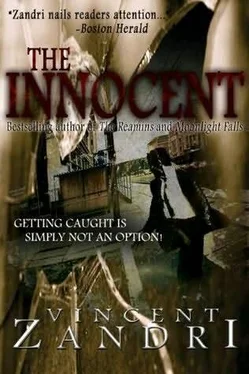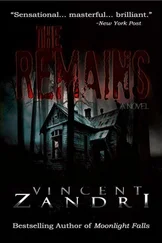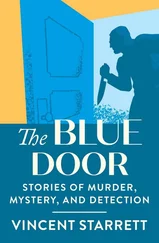When the last strip of cloth was undone and Cassandra could sit up, she slapped me.
“Thanks,” I said, bringing my hand to my stinging cheek.
“That was for not trusting me,” she scolded.
I might have slapped her back if she hadn’t started crying.
She looked weary now, not in the moonlight, but in the dim light that leaked in from both the kitchen lamp and the fire. She ran her hands through her thick hair, got up off the bed, and marched into the kitchen. I followed her out and noticed how she paused just long enough to get a quick look at the beef stew cooking on the stove. Then she went into the great room and sat down in front of the fire.
I followed her in.
She brought her knees to her chin, wrapped her arms tightly around them, stared into the flames.
“First comes the denial,” she said, wiping her eyes. “Then comes the grief. Just wait till I get to the angry part.”
The case of Beaujolais was under the kitchen table. I took out a bottle, opened it with a corkscrew I’d found inside the junk drawer next to the sink. I ladled some of the beef stew into a couple of bowls and poured some red wine into two coffee mugs. Mugs in one hand and plates in the other, I managed to carry everything into the living area of the cabin and set it down by the fire without spilling even a single drop of wine or gravy.
Cassandra took one look at her plate and turned back to the fire.
I sat down, picked up my plate, and set it carefully in my lap.
“I think it’s time we had a little talk,” I said in my best diplomatic, let’s-make-peace tone of voice.
Cassandra dipped the tip of her index finger into the thick stew, brought it to her lips and tongue. Her teardrop eyes glistened from the fire and her crying.
I took a bite of the stew. It was hot and tangy on my tongue.
“I’m ready to listen if you’re ready to talk,” I said. But I could see that it would be no use pressing her. Cassandra was in too much pain to talk. I suppose I couldn’t blame her. Her boyfriend had just taken a round in the back of the head, point-blank. I knew what it was to lose someone you loved.
“Would it help,” I said, “if I told you it can only get better?”
She looked at me with a blank stare and said, “Look who’s predicting the future.”
I finished off my beef stew and wine in silence. I finished it all, right there on the rough wooden floor of my grandfather’s cabin, in the exact spot where he used to sit after an afternoon fly-fishing Putt’s Creek, the narrow stream that ran parallel to the east-west road.
I took the empty bowl into the kitchen and put it in the sink. I filled my mug with more wine. I knew the time was ripe for me to get some answers. I also knew the longer I waited, the longer it would take for me to figure out just who was responsible for this mess. I stood there in the kitchen with the wine in my hand and it was all I could do not to grab hold of Cassandra and make her spill the truth right there and then. But all she could manage right now was tears. And I couldn’t blame her.
It was getting close to eleven o’clock. I hadn’t slept in what seemed like days. Maybe this was as good a time as any to get a little rest. There was no telling when I’d get the chance to sleep again. So that’s what I decided to do. Get some rest. While I had the time and the opportunity.
Maybe I was taking a bigger chance than I realized. But Cassandra was still sitting by the fire, on her own, when I took the bottle with me into the bedroom so that she could be left alone with her thoughts about a past and a future I knew she wanted nothing to do with.
BUT THEN I KNEW all about the power of the past, about the power of sleep. I knew that sleep could make my past come alive again in dreams, so that one second I am staring at the cabin ceiling and the next it is morning inside Attica State Prison on the fourth and final day of an insurrection that has already claimed a dozen lives and will claim dozens more before it is finished. I am walking the catwalk-the narrow concrete platform that spans the perimeter of D-Yard’s interior-thirty feet above the naked ground. The walk is protected on both sides by connected lengths of pipe railing. My right hip rubs against the railing as I walk toward the place where the catwalks from this and the other three yards merge in the center of the Attica State Prison complex to form a cross. The area in the center, where the catwalks intersect, is called Times Square by inmates and COs alike.
A rebel inmate presses a shiv up against the back of my neck where the spine meets the brain and pushes me along by the collar of my yellow prison jumpsuit. He presses the razor up against the tight flesh surrounding the spine, until I feel the eye-watering sting of a blade on the verge of popping through the skin.
Up ahead, another inmate holds a service revolver against Wash Pelton’s skull. Like me, Wash is dressed in a yellow inmate jumpsuit. Unlike me, he is lucky enough to have a pair of work boots to protect his feet. He struggles with the pistol-bearing inmate, trying to break free from the arm the man has wrapped around his neck. He pushes and pulls until the rebel inmate clips him on the back of the skull with the service revolver. Wash goes down on his knees, onto the concrete.
I try to keep up with the pace of the inmate who pushes me along. I haven’t eaten in three days, haven’t slept in four. I can’t maintain my balance.
It seems like hours pass before we finally make it to Times Square. It’s there that Wash Pelton is pulled back up to his feet by the rebel inmate after having been literally dragged. Then the inmate forces the barrel of the revolver into Pelton’s mouth. That’s when Pelton begins to cry. Tears and saliva drip down the barrel of the revolver. The hum from the crowd of inmates that fills D-Yard dies down. All eyes are on Pelton and myself and a third hostage who takes his position by my side. Norman is unconscious or catatonic, I don’t know which. He shows no sign of waking. Two rebel inmates hold him up, one on each arm. The inmate on his right points the skinny barrel of a prison-issue M-16 at his head. But the M-16 has no effect on Mike Norman.
There are puddles of muddy water. There are piles of clothes and garbage. In a far corner of the yard a fire is blazing. It rained hard all night. And the corrections officers had been left out in the rain. No one except Mike slept. From over the prison PA system comes the tinny voice of the Commissioner of Corrections for New York. “Give up your hostages or you will be met with force.” No one pays even the slightest attention to the voice. Not the hostages or the inmates. The Commissioner, after all, addresses us from outside these stone walls.
Above us a black-and-white state police chopper makes a flyby. The rebel inmates aim their weapons at the helicopter. From Times Square I can make out the squad of state troopers poised along the west wall. Sharpshooters with scopes and rifles (.270caliber sniper jobs, I assume) aimed in my direction. The rebel inmates are dressed in corrections officer uniforms. The hostages are dressed in yellow inmate jumpsuits-suits designed specifically for transporting prisoners outside the prison walls. I wonder if the state troopers can tell the difference between a hostage and a rebel inmate from that distance. I wonder if it will really matter to them once the shooting starts.
Behind the row of sharpshooters the live television crews are watering at the mouth, hoping for one or more of our heads to be blown away. What a scoop it would make. What a report. What had become a gentle hum among the rebel inmates in D-Yard has once again become screaming. “Kill the screws! Blow their brains out!”
Читать дальше












